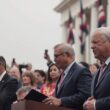The composition of Germany’s governing coalition committee is facing renewed scrutiny as Nina Warken, Federal Minister of Health and chairwoman of the CDU’s Women’s Union, publicly advocates for greater female representation. Currently, the committee, a pivotal body within the black-red coalition government, comprises eight men and only one woman – SPD leader Bärbel Bas. Warken, in an interview with the Tagesspiegel, declared this imbalance “not the final word” highlighting a significant disconnect between the CDU’s stated commitment to gender equality and the reality of its internal power structures.
Warken’s call for reform follows the CDU’s recent introduction of a quota system for female representation within the party itself, an initiative spearheaded by the Women’s Union. She emphasized that this progressive policy must be consistently applied across all levels of the party, from federal to state and crucially, within the critical Koalitionsausschuss. Critics argue that the current lack of substantive female influence within the committee undermines the government’s credibility on issues impacting women and diminishes the effectiveness of policy development.
The recent composition of candidate lists in the state of Saxony-Anhalt, featuring only two women in the top ten positions, has further fueled the debate. Warken’s sharp condemnation of such lists underscores a broader concern over the persistent underrepresentation of women in key political positions. While the CDU has implemented internal quotas, questions remain about their enforcement and the underlying cultural barriers that continue to impede women’s advancement. Observers suggest that the ongoing discussion, prompted by Warken’s intervention, will likely intensify pressure on the coalition to fundamentally reassess its approach to gender equality and ensure a more equitable distribution of power within the governing structures. The incident exposes the challenge of translating stated ideals into tangible and equitable outcomes within German politics.





